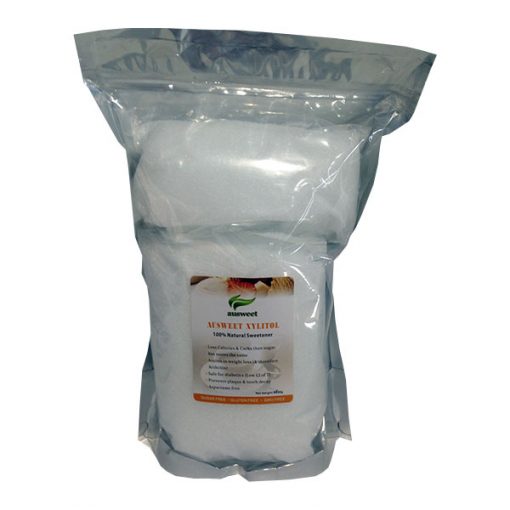Product Description
Xylitol is an all-natural substance that is produced by human body during normal glucose metabolism. Xylitol is found in nature in berries, mushrooms, birch trees and corncobs. It looks and tastes like sugar, but with fewer calories and carbohydrates, and teaspoon for teaspoon behaves like sugar in almost all your recipes.
Xylitol has been scientifically known for about 120 years. Discovered independently by Emil Herman Fischer & Rudolf Stahel in Germany and M. G Bertran in France, its potential benefits remained dormant for the first few decades afterwards. During World War II, Finland was suffering from an acute sugar shortage. With no domestic supply of sugar, the Finnish Sugar Company searched for an alternative. It was then that the Finnish scientists re-discovered xylitol, a low-calorie sugar made from birch bark. It had in fact, been known to the world of organic chemistry since it was first manufactured in 1891 by a German chemist.
By 1930, xylitol had been purified, but it wasn’t until World War II that the sugar shortages forced researchers to look at alternative sweeteners. It was only when xylitol was stabilised that it became a viable sweetener in foods. It was also during this time that researchers discovered xylitol’s non insulin-independent nature (it metabolises in the body without using insulin).
By the 1960s, xylitol was being used in Germany, Switzerland, the Soviet Union and Japan as a preferred sweetener in diabetic diets and as an energy source for “infusion therapy” in patients with impaired glucose tolerance and insulin resistance. Since then, many other countries including Italy and China have been producing xylitol for use in their domestic markets.
Xylitol is a natural substance found in fibrous vegetables and fruit, as well as in corn cobs and birch tree. It is a natural, intermediate product which regularly occurs in the glucose metabolism of man and other animals as well as in the metabolism of several plants and micro-organisms. Xylitol is produced naturally in our bodies, in fact we make up to 15 grams daily during normal metabolism.
Although xylitol tastes and looks exactly like sugar, that is where the similarities end. Xylitol is really sugar’s mirror image. While sugar wreaks havoc on the body, xylitol heals and repairs. It also builds immunity, protects against chronic degenerative disease and has anti-ageing benefits. Xylitol is considered a five-carbon sugar, which means it is an antimicrobial, preventing the growth of bacteria. While sugar is acid forming, xylitol is alkaline enhancing. All other forms of sugar, including sorbitol, another popular alternative sweetener, are six-carbon sugars which feed dangerous bacteria and fungi.
Approved by the US Food and Drug Administration (FDA) in 1963, xylitol has no known toxic levels. The only discomfort, that some sensitive people may notice initially when taking large amounts is mild diarrhoea or slight cramping. Since the body makes xylitol daily, as well as the enzymes to break it down, any discomfort usually disappears within a few days as the body’s enzymatic activity adjusts to a higher intake.
The benefits of using xylitol include:
- Xylitol does not cause an insulin reaction in the body, making it desirable for people with diabetes and hypoglycemia and for low carbohydrates dieters;
- Xylitol has a low Glycemic Index of just 7 (Foods with lowest numbers are the healthiest, table sugar rates 110, and glucose rates 100);
- Xylitol helps prevent tooth decay;
- Xylitol reduces plaque formation on teeth;
- Xylitol may help prevent osteoporosis;
- Xylitol stops the development of strep bacteria in the mouth and intestines;
- Xylitol has 40% fewer calories than sugar and is as sweet as sugar;
- Xylitol has 75% fewer carbohydrates than sugar.

